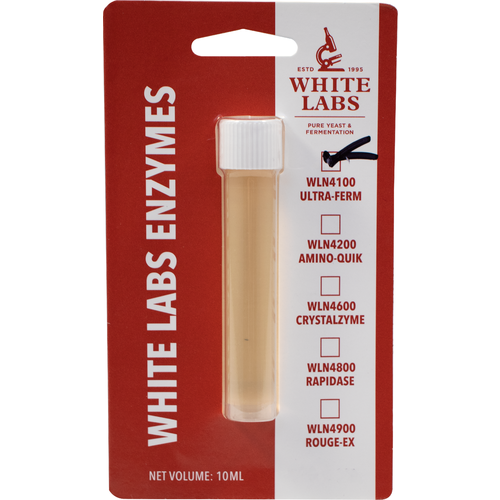White Labs – WLN-4100 Ultra-Ferm Grain To Glass Inc
$ 4,99 $ 2,99
White Labs Ultra-Ferm is a liquid amyloglucosidase (highly concentrated) from selected classical strain of Aspergillus niger. Ultra-Ferm can be used to make Brut IPAs.
APPLICATIONS:
1) To reduce saccharification times.
2) To saccharify unmalted cereal brews.
3) To increase attenuation.
FUNCTION IN BEER PRODUCTION:
Brewers often want to produce light beers or dietetic beers. In these cases the brewer wants a controlled or complete hydrolysis of starch and dextrins to fermentable glucose. Traditional brewing methods permit only 75 to 80% hydrolysis of starch present in the grain raw material. Ultra-Ferm amyloglucosidase permits total hydrolysis of dextrins to fermentable glucose, from all types of starch.
In the brewhouse, the recommended application dosage of Ultra-Ferm is 0.8 to 3.2L per ton of starch. It can be added at the beginning of the mash-in. Ultra-Ferm optimal pH is between 3.5 and 5.5. Temperature should not exceed 60°C. Amyloglucosidase activity is completely destroyed when the wort is held at 85°C for 10 minutes.
FUNCTION IN SPIRITS PRODUCTION:
After starch liquefaction by alpha-amylase, dextrins are hydrolysed in glucose by amyloglucosidase, before alcoholic fermentation. Ethanol production is faster and yield is higher. The recommended saccharification temperature is 60°C.
A suitable substrate for saccharification is a liquefied starch with a dextrose equivalent (DE) between 10 and 20. A higher DE than 20 might reduce the saccharification efficiency. The concentration of the substrate will also influence the saccharification efficiency. A concentration of 20-25% is a general practice. ULTRA-FERM dosage, for given reaction time, depends on the amount of glucose requested. It is usually recommended to add 400 ml per ton of starch for a fast hydrolysis. Possible pH range of use is from 3.5 to 5.5 with optimal between 4.0 and 5.3.
Optimal temperature is 60°C. Amyloglucosidase activity is completely destroyed when the saccharified liquor is held at 85°C for 10 minutes. As an example: a yield of 94% glucose can be obtained after 40 hours with 36000 AGI per kg dry matter; after 72 hours with 17000 AGI/kg and after 85 hours with 13000 AGI/kg, at pH 4.5 with temperature 60°C.
Professionally packed and fast shipping
Through our long-term relationship with UPS, FedEx, DHL and a variety of other leading global carriers, we are able to offer various shipping options. Our warehouse staff is highly trained to pack your goods exactly according to the specifications we offer. Your goods are thoroughly checked and properly secured before shipping. We ship to thousands clients every day in a variety of countries. This is a sign of our determination to become the largest online retailer worldwide. We have distribution centers as well as warehouses located in Europe and in the USA.
Note that orders containing more than one item will be subject to a processing period that is based to the specific item.
Before shipment, all ordered items will be thoroughly inspected. The majority of orders will be sent within 48 hours. The delivery time is between 3 and 7 working days.
Returns
The stock is constantly changing and is not completely managed by us because of the involvement of many entities, including the factory as well as our warehouse. Stocks can be changed at any time. It is possible that the stock may run out after the order has been made.
Our policy is valid for a period of 30 days. If it's been more than 30 days since the date you bought the item, we unfortunately can't give you a complete refund or exchange.
In order for your item to be returned, it must be unopened and in the same state as you received it. It should also be returned in its original packaging.
Related products
G2G ALL GRAIN KIT
Bat Country IPA – Grain To Glass All Grain Beer Kit grain to glass
MANGROVE JACK'S KIT
American IPA (Includes Dry Hops) – Mangrove Jack’s Craft Series Grain To Glass Inc
MANGROVE JACK'S KIT
American Pale Ale – Mangrove Jack’s NZ Series Grain To Glass Inc
G2G ALL GRAIN KIT
American Porter – Grain To Glass All Grain Beer Kit grain to glass
G2G EXTRACT KIT
Bat Country IPA- Grain To Glass Extract Beer Kit grain to glass
Cleaning Products
MANGROVE JACK'S KIT
Bavarian Wheat – Mangrove Jack’s Craft Series Grain To Glass Inc
MANGROVE JACK'S KIT
American Pale Ale (Includes Dry Hops) – Mangrove Jack’s Craft Series Grain To Glass Inc
MANGROVE JACK'S KIT
Apple Cider Kit (Hopped with Citra) – Mangrove Jack’s Grain To Glass Inc




































